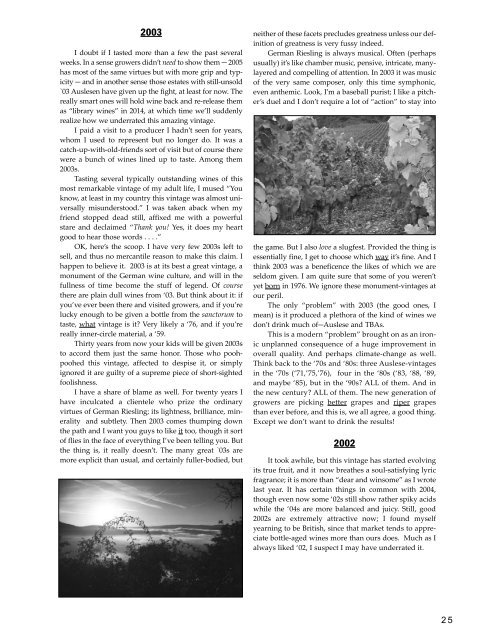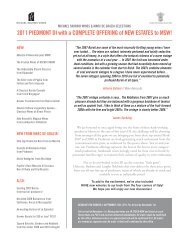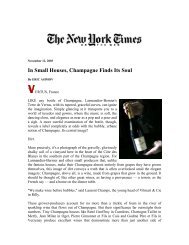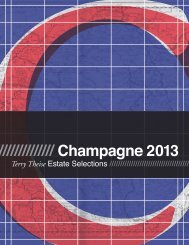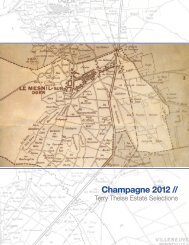German Catalog 2006 USE THIS ONE.qxp - Michael Skurnik Wines
German Catalog 2006 USE THIS ONE.qxp - Michael Skurnik Wines
German Catalog 2006 USE THIS ONE.qxp - Michael Skurnik Wines
You also want an ePaper? Increase the reach of your titles
YUMPU automatically turns print PDFs into web optimized ePapers that Google loves.
2003<br />
I doubt if I tasted more than a few the past several<br />
weeks. In a sense growers didn’t need to show them — 2005<br />
has most of the same virtues but with more grip and typicity<br />
— and in another sense those estates with still-unsold<br />
`03 Auslesen have given up the fight, at least for now. The<br />
really smart ones will hold wine back and re-release them<br />
as “library wines” in 2014, at which time we’ll suddenly<br />
realize how we underrated this amazing vintage.<br />
I paid a visit to a producer I hadn’t seen for years,<br />
whom I used to represent but no longer do. It was a<br />
catch-up-with-old-friends sort of visit but of course there<br />
were a bunch of wines lined up to taste. Among them<br />
2003s.<br />
Tasting several typically outstanding wines of this<br />
most remarkable vintage of my adult life, I mused “You<br />
know, at least in my country this vintage was almost universally<br />
misunderstood.” I was taken aback when my<br />
friend stopped dead still, affixed me with a powerful<br />
stare and declaimed “Thank you! Yes, it does my heart<br />
good to hear those words . . . .”<br />
OK, here’s the scoop. I have very few 2003s left to<br />
sell, and thus no mercantile reason to make this claim. I<br />
happen to believe it. 2003 is at its best a great vintage, a<br />
monument of the <strong>German</strong> wine culture, and will in the<br />
fullness of time become the stuff of legend. Of course<br />
there are plain dull wines from ‘03. But think about it: if<br />
you’ve ever been there and visited growers, and if you’re<br />
lucky enough to be given a bottle from the sanctorum to<br />
taste, what vintage is it? Very likely a ‘76, and if you’re<br />
really inner-circle material, a ‘59.<br />
Thirty years from now your kids will be given 2003s<br />
to accord them just the same honor. Those who poohpoohed<br />
this vintage, affected to despise it, or simply<br />
ignored it are guilty of a supreme piece of short-sighted<br />
foolishness.<br />
I have a share of blame as well. For twenty years I<br />
have inculcated a clientele who prize the ordinary<br />
virtues of <strong>German</strong> Riesling; its lightness, brilliance, minerality<br />
and subtlety. Then 2003 comes thumping down<br />
the path and I want you guys to like it too, though it sort<br />
of flies in the face of everything I’ve been telling you. But<br />
the thing is, it really doesn’t. The many great `03s are<br />
more explicit than usual, and certainly fuller-bodied, but<br />
neither of these facets precludes greatness unless our definition<br />
of greatness is very fussy indeed.<br />
<strong>German</strong> Riesling is always musical. Often (perhaps<br />
usually) it’s like chamber music, pensive, intricate, manylayered<br />
and compelling of attention. In 2003 it was music<br />
of the very same composer, only this time symphonic,<br />
even anthemic. Look, I’m a baseball purist; I like a pitcher’s<br />
duel and I don’t require a lot of “action” to stay into<br />
the game. But I also love a slugfest. Provided the thing is<br />
essentially fine, I get to choose which way it’s fine. And I<br />
think 2003 was a beneficence the likes of which we are<br />
seldom given. I am quite sure that some of you weren’t<br />
yet born in 1976. We ignore these monument-vintages at<br />
our peril.<br />
The only “problem” with 2003 (the good ones, I<br />
mean) is it produced a plethora of the kind of wines we<br />
don’t drink much of—Auslese and TBAs.<br />
This is a modern “problem” brought on as an ironic<br />
unplanned consequence of a huge improvement in<br />
overall quality. And perhaps climate-change as well.<br />
Think back to the ‘70s and ‘80s: three Auslese-vintages<br />
in the ‘70s (‘71,’75,’76), four in the ‘80s (‘83, ‘88, ‘89,<br />
and maybe ‘85), but in the ‘90s? ALL of them. And in<br />
the new century? ALL of them. The new generation of<br />
growers are picking better grapes and riper grapes<br />
than ever before, and this is, we all agree, a good thing.<br />
Except we don’t want to drink the results!<br />
2002<br />
It took awhile, but this vintage has started evolving<br />
its true fruit, and it now breathes a soul-satisfying lyric<br />
fragrance; it is more than “dear and winsome” as I wrote<br />
last year. It has certain things in common with 2004,<br />
though even now some ‘02s still show rather spiky acids<br />
while the ‘04s are more balanced and juicy. Still, good<br />
2002s are extremely attractive now; I found myself<br />
yearning to be British, since that market tends to appreciate<br />
bottle-aged wines more than ours does. Much as I<br />
always liked ‘02, I suspect I may have underrated it.<br />
25


